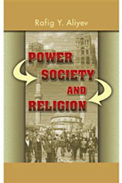"We tried to show that power as the vertical (governing system from the top) and society and religion as the horizontal, i.e. a system or totality of moral values upon which these three components of public relations are rested, representing a certain integrated organism."

 |
Power, Society and Religion by Rafig Y. Aliyev Trafford Publishing
book review by Barbara Bamberger Scott
Rafig Y. Aliyev argues that these three components of civilization, often perceived and portrayed as discordant, are actually interdependent and necessary to a healthy society. The author breaks the book, appropriately, into three segments. In the first, the historical nature of religion is examined. Aliyev presents how easy it is for belief to turn to ideology, and ideology to fanaticism: "A person who believes with soul and mind, becomes dangerous for surroundings—either he ceases to understand society he lives in or begins to eliminate society just because it doesn't meet with his belief, ideals and principles." The second segment examines the relationship between religion and power, and argues that one is necessary for the other: "Our task is somewhat to explain to people... that only strong power rested upon morality, is able to ensure freedom in society, to defend religion itself, freedom of religion and belief." The final section is dedicated to the role law and morality play in a democracy. Originally written after the acts of terror in Madrid, Spain, in 2004, the treatise examines the relationship between rights and morality: "Morality in its point is above any right, and in such cases our moral and ethic norms and century-old traditions must be placed above all."
As the director of the Center on Islamic Studies in his native Azerbaijan, and with a Ph.D. in philosophy and sixteen books to his credit, Rafig Y. Aliyev is clearly qualified to examine these pillars of civilization that affect us all so acutely. The author has provided his ideas in the hopes that the "theory and experience will help readers to familiarize themselves with complicated relations of power, society and religion." The book does suffer from awkward phrasing indicating some struggles with the complexities of the English language, but these aside, there is much of merit in the ideas expressed by this prolific author. He has a genuine concern for his people and his culture, and expresses it very strongly throughout this work.